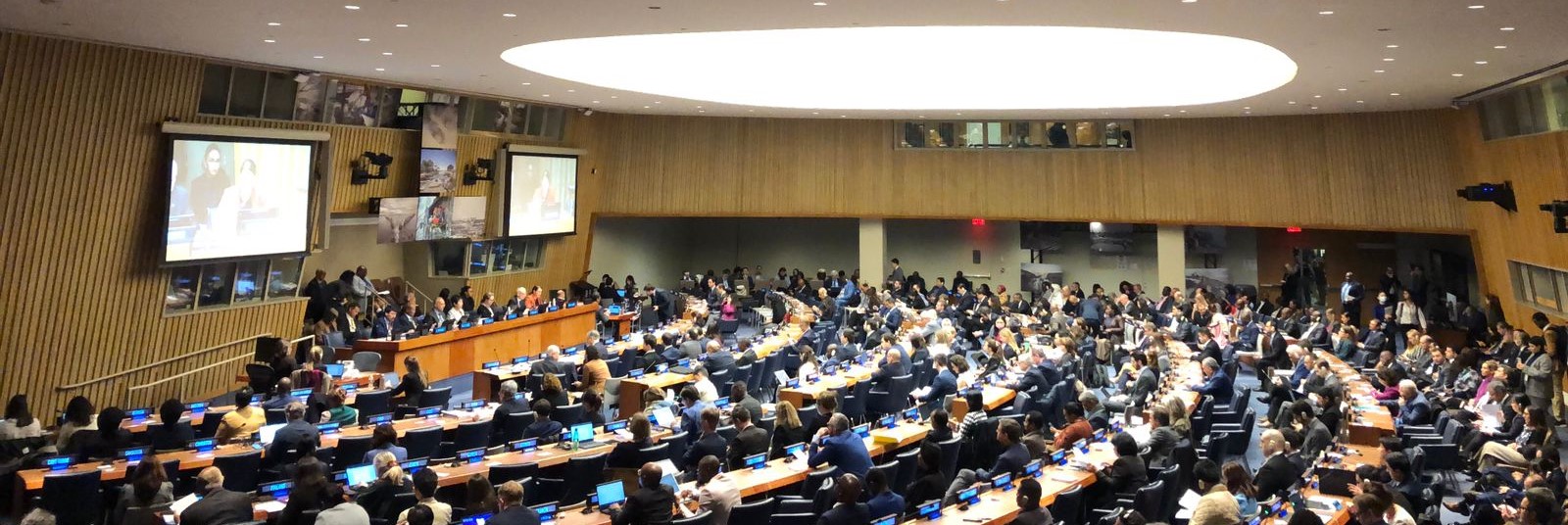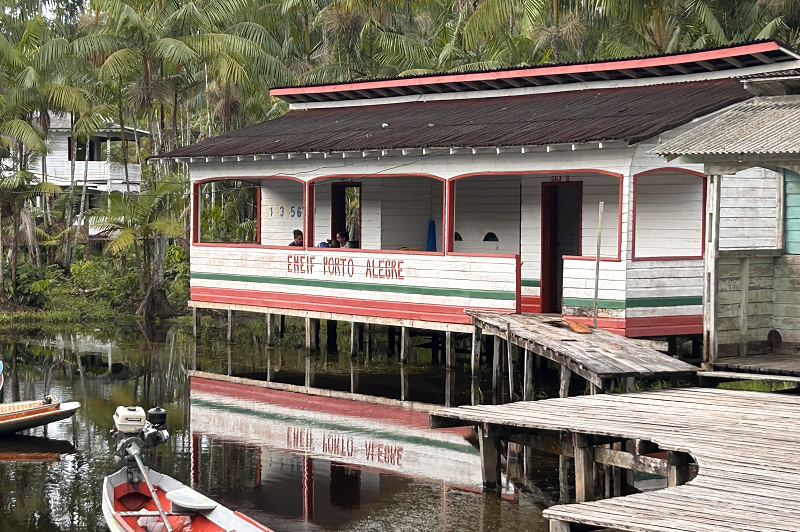IAS retrospective: water and sanitation in 2023
Highlights of 2023 include important events and debates in the sector, among them transversal issues such as climate change and human rights
Published in 22 Dec 2023
Written by By the IAS team
Tags:

In Brazil, a country with historical problems of access to water and sanitation, time may go by but the challenges remain the same. And 2023 was no different.
In fact, there was even a slight worsening of the situation. According to the 2023 Relatório Luz (Spotlight Report), Brazil has gone backwards in water and sanitation indicators, meaning that the 2030 target, established by the UN as a deadline for its member countries to make the world more sustainable and less unequal, has become more distant.
O ano foi marcado por importantes eventos nos campos da água, saneamento básico e temas transversais como mudanças climáticas e direitos humanos. Foi também um ano de ativismo, debates e mobilizações em torno da pauta do saneamento, urgente em um país onde metade da população segue sem acesso a esse serviço tão essencial. Que em 2024 sigamos avançando na luta pela universalização do saneamento.
Some of the year's highlights are as follows:

The water debate at the UN
The United Nations (UN) 2023 Water Conference, held at the UN Headquarters in New York, between March 22 and 24, was a historical event as the previous UN conference dedicated to water had taken place in 1977.
With the support of other civil society organizations, IAS demanded from the Brazilian government a participation that was worthy of the importance of the event. As a result, the Ministry of the Environment and Climate Change (MMA) sent an official delegation, headed by executive secretary João Paulo Capobianco. Fourteen Brazilian NGOs, including IAS, attended the conference, representing a larger network of 122 organizations.
Capobianco told the conference that access to water and sanitation is a form of social inclusion and reduction of inequalities and that it is necessary to include climate change when talking about water resource management. Civil society organizations presented important manifestos such as the Manifesto for Water Justice; the petition led by Avaaz with 560,000 signatures requiring the Brazilian government to guarantee the Human Right to Water; and the Women for Water Manifesto, launched by Rede das Mulheres de Língua Portuguesa pela Água (Portuguese-Speaking Women's Network for Water).

World Toilet Day in the streets and on social media
With the motto of "Accelerating Change," World Toilet Day 2023 was celebrated on November 19. In Brazil, IAS and an extensive network of partners campaigned to publicize the date and its importance, stressing the enormous worldwide deficit in access to sanitation.
Among the actions organized by the IAS was the creation and support of a special website dedicated to providing data on the lack of sanitation; an artistic intervention in the city of São Paulo by the "artivist" Mundano; a cycle of debates with professionals from the sector organized together with Rede Saneamento Tem Solução (Solutions for Sanitation Network) ; and three new episodes of the video series "Saneamento Tem Solução! Série Projetos e Iniciativas" (There is a Solution for Sanitation! The Projects and Initiatives Series), on ways to provide everyone everywhere with sanitation.
Dialogues on sanitation
In May IAS debuted the Diálogos IAS podcast, a space for in-depth conversations on water, sanitation and transversal themes. The first program featured Leo Heller, coordinator of Cooperação Internacional no Observatório Nacional dos Direitos à Água e Saneamento (International Cooperation at the National Observatory for the Human Rights to Water and Sanitation) (ONDAS), who was the UN Special Rapporteur on the human right to water and sewage treatment from 2014 to 2020.
The following program interviewed environmentalist João Paulo Capobianco, current executive secretary of the Ministry of the Environment and Climate Change (MMA), to talk about water and sanitation in the ministry's climate agenda. The most recent program featured a discussion between Marussia Whately, executive director of IAS, and Paula Pollini, public policy analyst at IAS, and Samuel Cavalcante, technical analyst for Social Policies at the National Secretariat for Environmental Sanitation of the Ministry of Cities.
The Relatório Luz (Spotlight Report) points out Brazil’s setback in the SDGs
Brazil has backtracked on more than 60% of the targets that make up the 17 Sustainable Development Goals (SDGs), a United Nations guideline document to achieve a more sustainable and less unequal world by 2030. Among them there are several related targets to water and sanitation.
The figure comes from VII Relatório Luz da Sociedade Civil da Agenda 2030 (7th Civil Society Spotlight Report on the 2030 Agenda) for Sustainable Development in Brazil, a study prepared by 41 civil society organizations, including the IAS, which coordinated the chapter on SDG 6, related to water and sanitation. The document was launched on September 25 in a ceremony at the General Secretariat of the Presidency of the Republic in Brasília, with the participation of ministries, public institutes and representatives of civil society.

Taking sanitation to schools in Marajó Island
Saneamento nas Escolas (Sanitation in Schools) is a project to bring access to water and sewage treatment solutions to around 460 schools, each with up to 50 students, on Marajó Island, in the northern state of Pará. In total, 18 thousand students from 16 municipalities will benefit. Known for its biodiversity and beauty, Marajó Island also has a considerable sanitation deficit. Only 13% of the region's population are on the water network, 2% have access to a sewage system, and 57% have inadequate water and sewage treatment, according to research by the Brazilian Development Bank (BNDES).
The initial diagnosis phase of the plan is expected to last three years and is carried out by the Habitat para a Humanidade Brasil (Habitat for Humanity Brazil)organization, in alliance with (IAS), the Federação de Órgãos para Assistência Social e Educacional (Federation of Social and Educational Assistance Organizations) (FASEBrazil's Cáritas - North Region II, and the Coordenação das Associações das Comunidades Remanescentes de Quilombos do Pará (Coordination of Remaining Quilombo Community Associations of Pará) (Malungu), with financing from the BNDES Socio-Environmental Fund.
The São Sebastião tragedy
In February, the municipality of São Sebastião, on the northern coast of the state of São Paulo, received the highest amount of rainfall ever recorded in the history of Brazil for a period of 24 hours. The extreme weather event caused a tragedy, leaving a trail of 65 deaths and considerable destruction caused by landslides and floods.
Data from the Municípios e Saneamento (Municipalities and Sanitation), uma iniciativa do IAS que consolida os números do saneamento em todos os municípios do Brasil, mostram como a tragédia de São Sebastião evidenciou o antigo déficit na oferta de água e esgoto para os moradores do município. 75,1% da população de São Sebastião é atendida com abastecimento de água, frente a média de 96,6% do estado de São Paulo e 84,2% do país. Já 60,42% da população é atendida com esgotamento sanitário, frente a média de 92,18% do estado de São Paulo e 66,95% do país.
Sanitation decrees: new rules for the Legal Framework
After being revised by the federal government due to resistance in Congress, new federal sanitation decrees were published in July 2023. These decrees regulate the 2020 Legal Framework and partially end a controversy on changes in the sector that has been dragging on since the beginning of the Lula government.
Decrees 11,598/2023 and 11,599/2023 organize concepts, extend deadlines, and review methodologies for proving economic-financial potential. The federal government withdrew proposals made in April, but disputes continue at a regional level. One of the justifications for the new wording of the decrees is to guarantee the possibility for companies, municipalities and states that did not meet previous deadlines and requirements to obtain financing from government resources.

Green light for the privatization of Sabesp
On December 6 Alesp approved the bill 1,501/2023, which authorizes the São Paulo state government to move forward with the privatization of Sabesp (Water and Sewage Service Provider). The process was carried out quickly and lasted less than two months. With 50 years of existence, Sabesp is one of the largest sanitation companies in the world and accounts for a third of investment in sanitation in Brazil. Sabesp is not a state-owned company but rather a mixed publicly-held company controlled by the government of the state of São Paulo, which owns 50.3% of its shares.
In an article published on its website, IAS highlights the questions that remain open in the company's privatization process. One of them is the lack of transparency in relation to the information used to support the government's arguments in favor of privatization. There are also doubts about the impact on the tariffs to be charged to consumers.
The expansion of IAS in socio-environmental alliances
In January, IAS joined Sanitation and Water for All (SWA) , a global and multisectoral alliance created in 2010 and linked to the United Nations, that brings together governments, civil society organizations, the private sector, research institutions, and the philanthropic community around the universalization of quality access to water, sanitation, and hygiene. Its mission is to eliminate inequalities in access to human rights to water and sanitation – raising the political will, ensuring good governance, and helping to optimize financing.
In January, IAS joined Climate Observatory (OC)(Climate Observatory). The network was created in 2002 to unite civil society organizations to discuss climate change and currently has 94 members, 17 of which have recently joined. The executive secretary of the OC, Marcio Astrini, highlighted that, even with the change in the Brazilian political scenario, the main point of contention on the socio-environmental agenda continues to be democracy. “We grew a lot in adversity, and now, in this new cycle, we need to strengthen the network both inside and outside Brazil,” stated Astrini.
The change in the Brazilian political scenario at the beginning of the Lula government brought relief to civil society organizations that support the socio-environmental agenda. However, the challenges remain enormous. "The socio-environmental agenda must, over the next four years, go hand in hand with policies to combat hunger and reduce social inequalities,” stated Mariana Clauzet, coordinator of Networks and Partnerships at IAS, at the annual meeting of the Climate Observatory from May 3 to 5 in São Paulo.
IAS participation in sanitation events
IAS was able to both participate in and contribute to many of the initiatives carried out throughout the year. There was a stimulating diversity of events, approaches, agendas and discussions.
In the 24th Marcha a Brasília em Defesa dos Municípios(March to Brasília in Defense of Municipalities), also known as the Marcha dos Prefeitos (March of the Mayors), held between March 27 and 30, IAS took part in a panel to discuss the challenges of the Legal Framework for Sanitation in municipalities.
From May 21 to 24, in Belo Horizonte, IAS took part in the 32º Congresso Brasileiro de Engenharia Sanitária e Ambiental(32nd Brazilian Congress of Sanitary and Environmental Engineering), held by the Associação Brasileira de Engenharia Sanitária e Ambiental (Brazilian Association of Sanitary and Environmental Engineering) (ABES), which debated topics such as environmental sanitation, the challenges for universalization, and sustainability.
The challenges to provide sanitation for all in small and medium-sized municipalities in the state of São Paulo was the theme of the Symposium Para além da análise superficial no Saneamento Básico(Beyond superficial analysis in Sanitation), held at the Institute of Advanced Studies of the University of São Paulo (IEA-USP) on August 3, with the participation of IAS.
At the 13th Virada Sustentável (Sustainable Events) in September 2023 Marussia Whately, executive director of IAS, mediated a discussion between the Minister of the Environment, Marina Silva, and the "water man of India," Rajendra Singh. The IAS took Realizada em setembro de 2023, foi a 13ª edição do evento. O IAS took Singh and environmentalist Martin Winiecki, from Tamera Project, also a speaker at Virada Sustentável, for a boat trip around the Guarapiranga dam, one of the largest reservoirs to provide water for the city of São Paulo.
Also in September Paula Pollini, public policy analyst at IAS, took part in the “Saneamento em Favelas” course (Sanitation in Favelas), from September 14 to 16. Carried out by Insper (Institute of Education and Research), with support from Instituto Galo da Manhã, Diagonal consulting and Ankara Engenharia, the event brought together professionals in the sector and promoted important debates on the topic.
The environmental agenda was highlighted by the IAS at the Seminário Nacional Aesbe (Associação Brasileira das Empresas Estaduais de Saneamento) 39 anos(Aesbe National Seminar (Brazilian Association of State Sanitation Companies) 39 years), held in Brasília from November 29 to December 1. IAS took part in the panel “ESG Agenda (Environmental, Social, and Governance) in the sanitation sector” on November 30.


